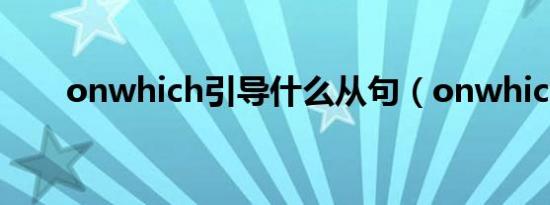
宾语从句是名词性从句的一种。在主从复合句中充任宾语,位于及物动词、介词或复合谓语之后的从句称为宾语从句,例如I know (that) you have met him.
1. that启发宾语从句时无寄义,不充任身分,常节略。
that不开导介词的宾语从句,至于except that, in that, save that, but that等是复合附属连词。
I know (that) you have met him.
Let's suppose that one day this happens to you.
在及物动词和宾语从句之间常有间接宾语(指人)。比如:
I told him (that) he was wrong.
在小批动词如:think, believe, suppose, expect, imagine, calculate, fancy, reckon, be supposed , seem, appear, feel as if, look as if, look like等后头的从句中的否认词常常迁移到主句谓语动词上,这叫否认前置/否认迁移。(hope“但愿”, guess“以为”后的宾语从句否认不前置。I hope not.“我但愿不是那样的”,是I hope so.的否认式。I don't hope so.是对hope的否认:“我不但愿如此”。)如:
I don't think it will be very cold today.
I don't think you are right.
I don't believe he has finished his work.
注意:
①非必须否认迁移。若需求夸大从句的否认时就不作迁移。
②不可把一切可否认转移动词的否认句都领悟为否认宾语从句,要凭据句意或语境而定。
I don't think diplomacy is a field for private enterprise.
We didn't think we'd be this late.
③当think用在疑问句中,或主句中的谓语动词与状语连用,或主句中的谓语动词被do夸大时,不行否认迁移转变。
Why do you think we can't change your note?
I do believe Tom never tells a lie.
They still didn't believe that the food would come.
I can't believe that they are married.
④否认迁移多用在主句动词为日常现在时的情形。
主句动词为日常昔时时、昔时完成时、昔时进行时、现在完成时、现在完成进行时,或主句动词与情态动词连用,就不能否认迁徙。此时若主句动词为否认,应思索是不是是对主句动词的否认。
I had thought that he would not come.
我已经想到了他不行来了。
⑤当宾语从句中有no, never, hardly, not at all, not a bit, not...enough, can't help doing等时不行否认迁徙。
I think I can't help laughing if I see it.
I believe he never tells a lie.
很多带宾语补足语的句子要用it作形态宾语,而把宾语从句置于句尾。
We think it wrong that he told a lie to everyone.
We thought it a pity that she should have missed the chance.
2. whether, if启发宾语从句:示意“是不是”可互换,白话中罕用if。
He asked if she would come.
细心下列情况下whether不可用if换:
1)启发主语从句置于句首时。
2)whether后没有单词隔断而直接跟or not时。
I don't know whether or not he will come.
3) whether从句作介词宾语时。
They are talking about whether he will win the game.
Everything depends on whether you agree with us.
4)whether后接不定式时。
I don't know whether to attend the meeting.
5)动词discuss, decide的宾语从句时。
3. 毗邻代词what, who, whose等开导的宾语从句。
Tell me what you want.
Do you know who will come at the meeting?
留心:who, whom依照古板语法,从句中who所庖代的名词如果是宾语应用宾格whom,但在白话中罕用who,如:
Do you know whom (who) he will invite?
①whose, which, what三个词都带有形容词性子。whose示意全部,意为“谁的”;which意为“哪一个”,what意为“甚么”。如:
Whose book it is not important.
Please tell me which school you want to go.
He didn't know what time it was.
②一般说来,which指的是在一个切实其实的、较精确的、有限的、较小领域;而what则指较广的或不精确的领域。如:which food,措辞人一般指面前的或精确领域的几种food;what food则指很多food,并且措辞民气中没有数。
I don't know which / what food you want.
假如边界较大可能没有甚么边界,最佳用what food。
4. 毗邻副词when, where, why, how启发的宾语从句。
I don't know when the meeting will be held.
Please tell me where I can find Tom.
He explained to me why he was absent from the meeting.
Can you tell me how I can get to the post office?
5. 可用whatever, whoever, whomever, whenever, wherever等向导宾语从句。
Please write down whatever he is saying.
I don't know whoever will come.
I'll do whatever you ask me to.
6. 默示爱憎心情的动词,如:enjoy, hate, love, like, dislike, don't mind, resent, appreciate(感谢感动)等以及某些介词末了的短语动词如:count on, depend on, rely on, see to, look forward to, be fond of, feel like, see to等后,即便没有宾补也要先接样式宾语it,再接宾语从句。
I like it when she smiles at me.
I love it when you sing.
I hate it if I am spoken to loudly in public.
除了but, besides, except, in, save, beyond六个介词后跟that启发的宾语从句外,其他介词都不能。in that是“原因”的道理,其它五个与that搭配都是“除了……”。
智能推荐
-

状语从句英语(状语从句)2023-08-29 状语从句指句子用作状语时,起副词效用的句子,能够点缀谓语、非谓语动词、定语、状语或全数句子。可分为时间、位置、理由、条目、方针、后果、退让等从句
-

定语从句是什么意思(定语从句是什么?)2023-08-23 一、关联代词与关联副词1、关联代词在定语从句中,能作联系代词的有which、that、who/whom
-

英语定语从句知识点总结(英语定语从句)2023-08-24 一、关连代词与关连副词1、关联代词在定语从句中,能作联系代词的有which、that、who/whom
-

条件状语从句的时态问题(条件状语从句的时态)2023-08-26 大家好,小裕来为大家解答以上问题。条件状语从句的时态问题,条件状语从句的时态这个很多人还不清楚,现在一起跟着小编来瞧瞧吧
-

什么是状语从句英语(什么是状语从句)2023-08-30 状语从句是指句子用作状语时,起副词功用的句子,能够润饰藻饰谓语、非谓语动词、定语、状语或所有句子;能够分为时间、住址、来因、条目、方针、结尾、倒退腐败等从句
-

宾语从句课件ppt(宾语从句课件)2023-08-21 宾语从句是名词性从句的一种,用来冒充宾语的句子叫做宾语从句。如:Heaskedwhatyouweredoinglastnight.他问你昨日晚上在干什么
-

倒装句的用法归纳及例句(倒装句的用法归纳)2023-09-07 倒装句分为十足倒装和一些倒装。十足倒装譬喻:Therebe+主语+所在或时间状语;一些倒装譬喻:only在句首,句子使用一些倒装
-

onwhich引导什么从句(onwhich)2023-08-31 大家好,小范来为大家解答以上的问题。onwhich引导什么从句,onwhich这个很多人还不知道,现在让我们一起来看看吧
-

英语从句类型总结图(英语从句类型总结)2023-09-06 英语从句首要有三种类别,分别为定语从句(限定性定语从句、非限定性定语从句)、状语从句(退让、时间、所在、形式等状语从句)和名词性从句(主语从句等)
-

as引导让步状语从句倒装的用法(as引导让步状语从句)2023-08-19 as启发倒退腐败状语从句:表语/状语+as+从句,as意为:尽管…可是、即使,经常从句要倒装,而用though启发倒退腐败状语从句时句子则无须倒装
-

高中英语三大从句专练100题(高中英语三大从句)2023-08-30 高中英语三大从句:宾语从句(在句子中起宾语效用的从句)、定语从句(在复合句中润饰藻饰名词、代词的从句),以及状语从句(在复合句中由从句示意的状语)
-

英语三大从句思维导图(英语三大从句)2023-08-19 英语三大从句:宾语从句(在句子中起宾语效用的从句)、定语从句(在复合句中润饰名词、代词的从句)、以及状语从句(在复合句中由从句示意的状语)
